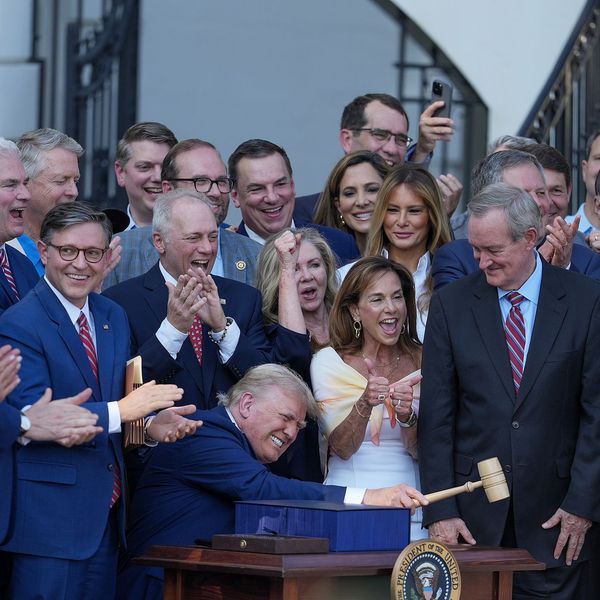Don't Lower the Corporate Tax Rate
Republicans love to talk about how high the U.S. corporate tax rate is, and how bad that is.
But when you examine their arguments, their case falls apart.
They predicate it on the fact that the current tax rate is 35 percent. But because of creative accounting and loophole sneaking, the actual rate that corporations paid last year was just 12.1 percent.

Many of our biggest companies paid nothing in corporate taxes, or even got rebates.
Take GE, for example. In the last decade, it made $81 billion in profits but paid only 2.3 percent in corporate income taxes. And over the last five years, it got $2.7 billion in rebates.
So for all the crying over how high the corporate tax rate is, it's pretty much a myth. As Robert Reich points out, corporate taxes used to account for one out of every three dollars of federal tax revenue back in Eisenhower's day. Now they account for only one out of every ten dollars.
And no less a knowledgeable person on corporate profitability than Warren Buffett says that "corporate taxes are not strangling American competitiveness."
We don't need to lower corporate taxes. We need to close the loopholes so they start paying their fair share.
Unfortunately, the Obama Administration has already proposed lowering the corporate tax rate to 28 percent, though he cushions that by proposing to close loopholes, as well.
What's likely to happen, however, is that Congress will agree to lowering the corporate tax rate while closing few, if any, loopholes that corporations routinely use.
That's how Washington works these days.
An Urgent Message From Our Co-Founder
Dear Common Dreams reader, The U.S. is on a fast track to authoritarianism like nothing I've ever seen. Meanwhile, corporate news outlets are utterly capitulating to Trump, twisting their coverage to avoid drawing his ire while lining up to stuff cash in his pockets. That's why I believe that Common Dreams is doing the best and most consequential reporting that we've ever done. Our small but mighty team is a progressive reporting powerhouse, covering the news every day that the corporate media never will. Our mission has always been simple: To inform. To inspire. And to ignite change for the common good. Now here's the key piece that I want all our readers to understand: None of this would be possible without your financial support. That's not just some fundraising cliche. It's the absolute and literal truth. We don't accept corporate advertising and never will. We don't have a paywall because we don't think people should be blocked from critical news based on their ability to pay. Everything we do is funded by the donations of readers like you. Will you donate now to help power the nonprofit, independent reporting of Common Dreams? Thank you for being a vital member of our community. Together, we can keep independent journalism alive when it’s needed most. - Craig Brown, Co-founder |
Republicans love to talk about how high the U.S. corporate tax rate is, and how bad that is.
But when you examine their arguments, their case falls apart.
They predicate it on the fact that the current tax rate is 35 percent. But because of creative accounting and loophole sneaking, the actual rate that corporations paid last year was just 12.1 percent.

Many of our biggest companies paid nothing in corporate taxes, or even got rebates.
Take GE, for example. In the last decade, it made $81 billion in profits but paid only 2.3 percent in corporate income taxes. And over the last five years, it got $2.7 billion in rebates.
So for all the crying over how high the corporate tax rate is, it's pretty much a myth. As Robert Reich points out, corporate taxes used to account for one out of every three dollars of federal tax revenue back in Eisenhower's day. Now they account for only one out of every ten dollars.
And no less a knowledgeable person on corporate profitability than Warren Buffett says that "corporate taxes are not strangling American competitiveness."
We don't need to lower corporate taxes. We need to close the loopholes so they start paying their fair share.
Unfortunately, the Obama Administration has already proposed lowering the corporate tax rate to 28 percent, though he cushions that by proposing to close loopholes, as well.
What's likely to happen, however, is that Congress will agree to lowering the corporate tax rate while closing few, if any, loopholes that corporations routinely use.
That's how Washington works these days.
Republicans love to talk about how high the U.S. corporate tax rate is, and how bad that is.
But when you examine their arguments, their case falls apart.
They predicate it on the fact that the current tax rate is 35 percent. But because of creative accounting and loophole sneaking, the actual rate that corporations paid last year was just 12.1 percent.

Many of our biggest companies paid nothing in corporate taxes, or even got rebates.
Take GE, for example. In the last decade, it made $81 billion in profits but paid only 2.3 percent in corporate income taxes. And over the last five years, it got $2.7 billion in rebates.
So for all the crying over how high the corporate tax rate is, it's pretty much a myth. As Robert Reich points out, corporate taxes used to account for one out of every three dollars of federal tax revenue back in Eisenhower's day. Now they account for only one out of every ten dollars.
And no less a knowledgeable person on corporate profitability than Warren Buffett says that "corporate taxes are not strangling American competitiveness."
We don't need to lower corporate taxes. We need to close the loopholes so they start paying their fair share.
Unfortunately, the Obama Administration has already proposed lowering the corporate tax rate to 28 percent, though he cushions that by proposing to close loopholes, as well.
What's likely to happen, however, is that Congress will agree to lowering the corporate tax rate while closing few, if any, loopholes that corporations routinely use.
That's how Washington works these days.

